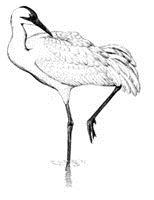North American Crane Working Group

Proceedings of the North American Crane Workshop
Date of this Version
2001
Document Type
Article
Citation
Mummert, Daniel P., Chambers, Carol L., and Ellis, David H. A comparison of behavior for two cohorts of captive-reared greater sandhill cranes released in northern Arizona. In: Ellis, David H., ed., Proceedings of the Eighth North American Crane Workshop, 11–14 January 2000, Albuquerque, New Mexico (Seattle, Wash: North American Crane Working Group, 2001), pp. 145-154.
Abstract
To determine how the behavior of greater sandhill cranes (Grus canadensis tabida) changes according to time of year, time of day, and number of days after release, we observed the activities of 2 groups of captive-reared greater sandhill cranes at Mormon Lake, northern Arizona. The behaviors we compared were alert, loafing, sleeping, foraging, preening, locomotion, and other. We found costume-reared subadult greater sandhill cranes that were established at the study site for a year spent more time foraging and being alert towards predators than parent -reared juvenile greater sandhill cranes that were recently released from captivity. We also found that with time juvenile sandhill cranes were increasingly alert and spent less time loafing. It appeared that captive-reared juvenile sandhill cranes learn behavior important for survival from previously released captive-reared cranes.
Included in
Behavior and Ethology Commons, Biodiversity Commons, Ornithology Commons, Population Biology Commons, Terrestrial and Aquatic Ecology Commons


Comments
Reproduced by permission of the North American Crane Working Group (NACWG).